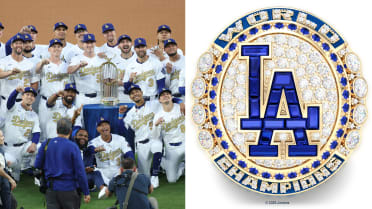PHILADELPHIA -- Jim Bunning, the only member of the National Baseball Hall of Fame to be elected to Congress, died late Friday night at 85.
Bunning, who suffered from complications following a stroke in October, spent most of his storied 17-year baseball career with the Tigers and Phillies from 1955-71, also pitching for the Pirates and Dodgers, winning 224 games and throwing a no-hitter with the Tigers in 1958 and a perfect game with the Phillies in 1964. He made nine All-Star teams and was inducted into the Hall of Fame in 1996.
Bunning was the first modern-era pitcher to win 100 games in each league, the first 20th-century pitcher to throw a no-hitter in each league and the second to record 1,000 strikeouts in each league.
"Jim was an incredible competitor and was determined to maximize his ability and make the most of everything he did in life," Phillies chairman David Montgomery said in a statement. "He clearly succeeded in doing so. The Bunning family has lost a very special patriarch, and we at the Phillies have lost a very special friend."
After Bunning's baseball career ended he managed in the Minor Leagues and served as an agent before he got into local and national politics. Bunning, who was born in Southgate, Ky., graduated from St. Xavier High School in Cincinnati in 1949 and earned a bachelor's degree in economics from Xavier University. He represented Kentucky's 4th district in the U.S. House of Representatives for six terms from 1987-99. He then represented Kentucky for two terms in the U.S. Senate from 1999-2011.
"Jim Bunning led an extraordinary life in the National Pastime and in public service," Commissioner Rob Manfred said in a statement. "In his baseball career, Jim was proud of always taking the ball. The work ethic that made him a Hall of Famer led him to the House of Representatives and the United States Senate. On behalf of Major League Baseball, I send my deepest condolences to Senator Bunning's family, friends, constituents and the many fans who admired his career in our game."
"As those within the baseball community know, [Bunning] is one of the most important figures in the history of the Major League Baseball Players Association," MLBPA union boss Tony Clark said in a statement. "An All-Star and Hall of Famer on the field, among Jim's long list of baseball accomplishments was his role on the MLBPA search committee that hired Marvin Miller as the union's first executive director. Recognizing the need to ensure that all players receive fair representation in their dealings with Major League club owners, Jim, along with a number of his peers, helped pave the way for generations of players. That responsibility of leaving the game better for those who follow remains in place today, 51 years later."
Those who played with and against Bunning remember his fiercely competitive nature.
"Tremendous, tremendous person who taught me a lot about the game," said Phillies bench coach Larry Bowa, who played with Bunning with the Phillies from 1970-71. "I remember him coming up and saying, 'Don't ever, ever lose your energy. I don't want to turn around and see your head dropping because you're 0-for-3.' He said, 'You've got to be accountable. You've got to play with energy. You've got to play every inning of every game.'"
"When he walked onto the mound he was wound up as tight as you could wind up a guy to win," former Phillies catcher Clay Dalrymple said in the Phillies' book "The Good, The Bad, & The Ugly." "And that's one of the reasons he was successful."
"He was nasty," Jim Fregosi said.
Bunning not only struck out 2,855 batters in his career -- he ranked second in baseball history in strikeouts to Walter Johnson when he retired -- he hit 160, leading the National League in hit batsmen each season from 1964-67.
"Let me put it this way," Fregosi said about being in the batter's box against Bunning, "my heart was always there, but my ass was never there."
Bunning threw the first perfect game in modern National League history on Father's Day against the Mets on June 21, 1964, at Shea Stadium.
It is baseball tradition not to talk to a pitcher in the middle of a no-hitter or perfect game, so Bunning did most of the talking throughout the game.
"Just nine more outs!" he said to his teammates in the dugout. "Come on! Let's get that perfect game!"
He later said he was simply trying to relieve some of the pressure by talking.
"He was silly on the mound whenever I went out to talk to him," said former Phillies catcher Gus Triandos, who caught Bunning that historic afternoon. "He was jabbering like a magpie. In the ninth inning, he told me to tell him a joke. I couldn't think of anything. All I could do was laugh."
Bunning, whose No. 14 is retired by the Phillies, is forever linked to Philadelphia's infamous late-season collapse in 1964, when the team lost a 6 1/2-game lead over the Cardinals and Reds with just 12 games to play.
Bunning is survived by his wife of 65 years, Mary, nine children and 35 grandchildren. Visitation will be held at Muehlenkamp-Erschell Funeral Home in Fort Thomas, Ky., on Friday from 2 p.m. to 8 p.m. ET. Mass of Christian burial will be at 10 a.m. ET June 3 at the Cathedral Basilica of the Assumption in Covington, Ky.
"Kentucky lost a true hero," Kentucky Sen. Rand Paul tweeted. "Senator Bunning was fearless on the mound and in the halls of Congress. He will be missed."
Todd Zolecki has covered the Phillies since 2003, and for MLB.com since 2009. Follow him on Twitter and Facebook and listen to his podcast.
Marty Noble is a contributor to MLB.com.



